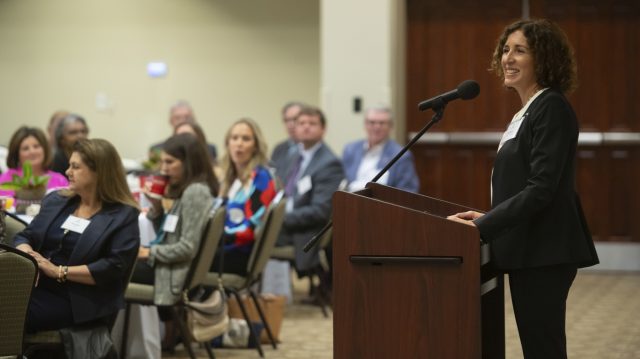
The 20th annual UM Banking and Finance Symposium kicked off with Rebeca Romero Rainey, president and CEO of Independent Community Bankers of America, leading the first ‘Women in Finance’ breakfast. Photo by Kevin Bain/Ole Miss Digital Imaging Services
OXFORD, Miss. – Officials from regional banks and other financial industry firms explored the impact of technology on the banking and finance industry, particularly in the wake of COVID, at the University of Mississippi‘s 20th annual Banking and Finance Symposium.
The annual conference, held Nov. 12 at the Oxford Conference Center, was open to Ole Miss students, alumni, finance professionals and business leaders. The event was co-hosted by Ken Cyree, dean of the UM School of Business Administration, and Stan Viner, chair of the Banking and Finance Advisory Board, and featured numerous speakers and panelists throughout the day.
“The 20th Banking and Finance Symposium continued the tradition of an excellent educational event with outstanding industry leaders speaking to the audience of financial professionals and students,” Cyree said. “There were many friendships renewed and an outstanding mood from the attendees and all involved.
“It was a wonderful day and helped us continue the outstanding momentum we have enjoyed in the banking program here at Ole Miss.”
The event kicked off with Rebeca Romero Rainey, president and CEO of Independent Community Bankers of America, leading the first “Women in Finance” breakfast, where she discussed the significance of acting on seen opportunities or gaps in the industry.
Rainey pointed out that community banking is dependent on the engagement and success of the community. She also elaborated on the idea of digitalization and said the “demonstration of resilience is why I’m so optimistic about the future of banking.”
Scott Anderson, head of investment banking and managing director at KBW, later joined Rainey in discussing the impact that digitization has played in the industry. Anderson used numerous graphics to show the short-, medium- and long-term effects this industry is experiencing while discussing what’s next for the future of banking.
Jill Castilla, president and CEO of Citizens Bank of Edmond, examined the impact that small community banks have and emphasized how she used social media to optimize her business’s search engines.
Bankers must adapt to the evolution of technology while “implementing storytelling in the self-interest of their customers,” she said.
In the afternoon, two industry panels were led by Viner and Carl Chaney, chairman of Beach Bank.
The first panel, “What’s Next?” hosted by Viner and moderated by Scott Mills, president of William Mills Agency, discussed the significance of FinTech and its advancements through the last decade.
The other looked at “M&A Trends in 2022 & Beyond,” hosted by Chaney and moderated by Paul Davis, director of market intelligence of Strategic Resource Management, which addressed the effects of COVID-19 on businesses and the industry as well as the need for strategic partnerships.
“Technology for business purposes used to be a convenience,” said Mitch Waycaster, president and CEO of Renasant Bank. “When COVID hit, that convenience became a necessity, and now that necessity has become a preference to our consumers.”
Both panelists, Waycaster and Chip Reeves, CEO of Beach Bank, credited regional banks for stepping up during COVID with stimulus checks and providing community support during a challenging time.
“This year’s event set new highs in attendance, sponsorships and the overall energy level,” Viner concluded. “We now have a 20-year history of hosting the Ole Miss banking symposium.
“This energy was a result of many factors, including the quality and diversity of our speakers/panelists and the huge success of our inaugural ‘Women in Finance’ breakfast.”